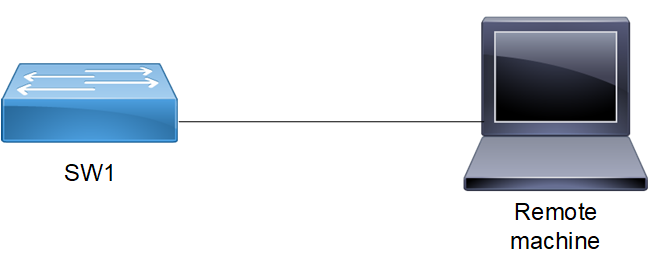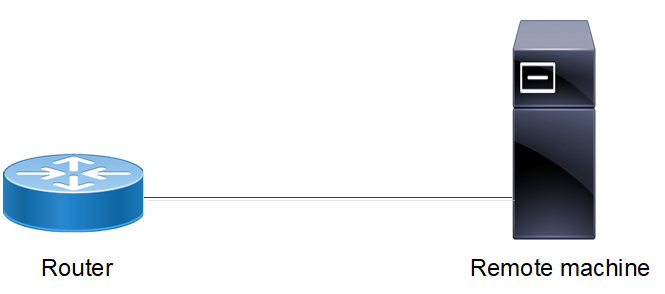Telnet Configuration
Overview
Telnet is a TCP/IP protocol used on the Internet and local area networks to provide a bidirectional interactive text- oriented communications facility using a virtual terminal connection. The Telnet program runs, connects it to a server on the network. A user can then enter commands through the Telnet program and they will be executed as if the user were entering them directly on the server console.Telnet enables users to control the server and communicate with other servers on the network. The default port number for Telnet protocol is 23.Telnet offers users the capability of running programs remotely and facilitates remote administration.
Support for In-band Management Over Default VRF
OcNOS supports Telnet over the default and management VRFs via in-band management interface and OOB management interface, respectively.
By default, Telnet runs on the management VRF.
Telnet Configuration with IPv4 Address
Topology

Telnet topology
Enable and Disable the Telnet Server
#configure terminal | Enter configure mode |
(config)#no feature telnet vrf management | Disable Telnet feature |
(config)#feature telnet vrf management | Enable Telnet feature |
(config)#commit | Commit the candidate configuration to the running configuration |
(config)#exit | Exit configure mode |
Configure the Telnet Server Port
#configure terminal | Enter configure mode |
(config)#no feature telnet vrf management | Disable Telnet feature |
(config)#telnet server port 6112 vrf management | Set Telnet port to 61112 |
(config)#feature telnet vrf management | Enable Telnet feature |
(config)#commit | Commit the candidate configuration to the running configuration |
(config)#exit | Exit configure mode |
Telnet Client Session
#telnet 10.10.10.1 vrf management | Log into remote machine using IPv4 address |
Validation
#show telnet server
VRF MANAGEMENT
telnet server enabled port: 23
VRF DEFAULT:
telnet server enabled port: 6112
#show running-config telnet server
feature telnet vrf management
no feature telnet
Telent Configuration with IPv6 Address
Telnet is performed with IPv6 IP and verified by logging on remote PC.
Topology
Figure 3-3 shows the sample configuration of Telent.

Telnet Configuration topology
Basic Configuration
#configure terminal | Enter configure mode |
(config)#no feature telnet vrf management | Disable Telnet feature |
(config)#feature telnet vrf management | Enable Telnet feature |
(config)#commit | Commit the candidate configuration to the running configuration |
(config)#exit | Exit configure mode |
Configure the Telnet Server Port
#configure terminal | Enter configure mode |
(config)#no feature telnet vrf management | Disable Telnet feature |
(config)#telnet server port 6112 vrf management | Set Telnet port to 6112 |
(config)#feature telnet vrf management | Enable Telnet feature |
(config)#commit | Commit the candidate configuration to the running configuration |
(config)#exit | Exit configure mode |
Telnet Client Session
#telnet 2001::1 vrf management | Log into remote machine using IPv6 address |
Validation
##show telnet server
VRF MANAGEMENT
telnet server enabled port: 23
VRF DEFAULT:
telnet server enabled port: 6112
#show running-config telnet server
feature telnet vrf management
no feature telnet